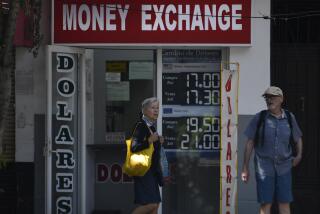Spaniards Spending With an Eye on the Clock
- Share via
MADRID — Mattresses, safes and freezers are disgorging wads of cash as Spaniards rush to spend secretly hoarded pesetas before the European Union’s new single currency renders the Spanish bills worthless.
Real estate, cars, jewelry and other big-ticket items top the shopping list for people shedding money stashed away over the years.
Reflecting Spaniards’ picaresque handling of money, much of the hidden cash--known as “dinero negro,” or black money--comes from real estate deals in which part of the payment was off-the-record to evade taxes.
Other sources include money laundered by drug traffickers and profits kept concealed by bar owners and small-time retailers.
They’re all racing against the clock because the EU’s euro currency will replace the peseta and 10 other national currencies Jan. 1. In Spain, euros and pesetas will coexist for two months, but come March the peseta will cease to be legal tender.
Since banks trading pesetas for euros are supposed to report transactions over $30,000, few Spaniards want to simply exchange the money legally because tax authorities might get curious about their piles of cash.
So stealth and speed are essential in disposing of rogue pesetas. The downturn in the world’s economy, exacerbated by the Sept. 11 terror attacks in the United States, is not slowing the spending since black money must be used now or it will simply disappear.
No one knows exactly how much stashed cash is seeping back into the economy. The Bank of Spain has no recent figure, but it estimated several years ago that Spaniards held $19 billion in undeclared cash. By one measure, that’s more than one-third of Spain’s money supply.
“We don’t have much of a taxpaying mentality here,” said bank spokesman Jose Luis Pellicer.
Other European Union countries report similar cash-flow oddities. In France, an estimated $140 million in hoarded cash is returning to circulation each week. Germany is carrying out spot checks of cars coming from Switzerland and Luxembourg, popular tax havens for Germans.
In Spain, so much cash has crawled out of the woodwork over the past few years that the Spanish central bank printed 10% fewer bills than expected in 2001.
“It’s all showing up in sales of apartments and cars,” Bank of Spain Governor Jaime Caruana told the newspaper El Mundo. “That said, it’s difficult to evaluate whether this is legitimate money or black money.”
By many accounts real estate is luring the largest chunk of this dough. Housing prices have risen steadily for three years--jumping 15% just from January to June--and economists and real estate agents say the increase is largely due to people laundering black pesetas.
Newspapers, grocery store bulletin boards and telephone poles are plastered with ads from people offering to buy houses and apartments for cash.
Much of the money gravitating toward real estate stems from earlier, slightly shady deals in the same sector.
“Black money, like energy, does not dissipate. It just changes form,” said lawyer Felix Bornstein.
The deals work like this: Buyer and seller agree on a price but put a lower amount on the deed. The difference--often 20% of the actual price, but sometimes as much as half--is paid in cash.
The use of black money suits both sides because the seller pays less in capital gains taxes and the buyer less in sales taxes.
The newspaper ABC reported that in one deal a buyer showed up with $124,000 in pesetas in stacks of cash frozen solid from being kept years in a freezer. Settlement was delayed for hours until the money thawed and could be counted.
Black money permeates life in Spain so thoroughly that the European Union recently estimated that a whopping 22% of Spanish gross domestic product last year was generated under the table. Belgium and Portugal had similar figures, and Greece beat all three, at 30%.
More to Read
Sign up for Essential California
The most important California stories and recommendations in your inbox every morning.
You may occasionally receive promotional content from the Los Angeles Times.













